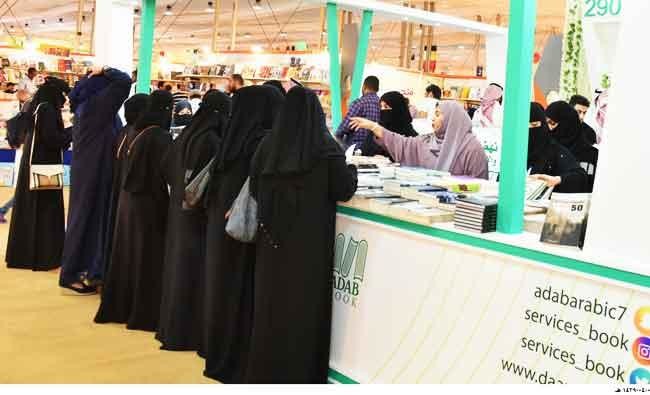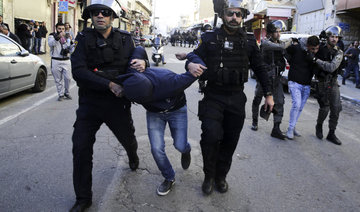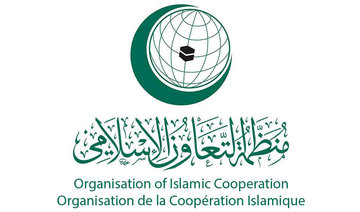JEDDAH: The Human Rights Commission in Saudi Arabia has said in a report that no fair observer can deny the recent empowerment of women in Saudi Arabia.
Women’s rights are stressed in the Basic Law of Governance, which prohibits discrimination against women and many other regulations contain provisions prohibiting all forms of discrimination.
Many criminal laws contain provisions providing for increased punishment when the victim is a woman, such as anti-trafficking laws, and participation in political and public life is a right available to every citizen in the Kingdom. A minimum of 20 percent of the seats in the Shoura Council have been allocated to women and the laws of the Kingdom have no provisions preventing women from holding senior positions.
The commission’s report stated that the labor system includes provisions to equalize rights and duties between men and women. The decision of the Minister of Labor No. (1/2370) dated 28/8/2010 prevent “any discrimination in wages between male and female workers.”
The Kingdom’s regulations guarantee maternity protection, especially in the workplace. The civil service system prohibits dismissal for any reason related to marriage or maternity.
The report added that Saudi systems offer women the opportunity to represent their government at regional and international levels, and there are no rules requesting the presence of a mahram (male guardian) for women to practice their legal, educational and other rights.
The report added that a judicial principle in 2013 gives women the right to divorce their husbands if they can not bear living with them. The Kingdom’s endorsement of the Convention on the Elimination of All Forms of Discrimination against Women gives them even more power.
The Commission’s report stressed that the issuance of the system of protection against abuse, which was prepared by a civil society institution, is a guarantee that contributes to stopping all forms of violence against women.
The Kingdoms education system is based on equality between men and women at all stages. The rate of illiteracy in the Kingdom 25 years ago was 60 percent, with women forming the majority of illiterate Saudis. This rate fell to just 5.31 percent in 2015.
The right to health care is one of the rights guaranteed by the Basic Law of Government. Article 27 of the law states that health care should be offered equally to men and women.
Saudi Vision 2030 states that women form an important component of the country's strength, accounting for more than 50 percent of the number of university graduates, and that work continues to develop their talents and enable them to have the opportunities to build their future and contribute to the development of society and the economy.
Human Rights Commission: Saudi Arabia supports women
Human Rights Commission: Saudi Arabia supports women

Japan hopes to attract more Saudi travelers through exhibitions in Kingdom

DUBAI: As Japan and Saudi Arabia approach their 70th anniversary of diplomatic relations, the Japan National Tourism Office is planning more exhibitions to attract Saudi travelers, the organization’s Dubai executive director Daisuke Kobayashi said.
Kobayashi told Arab News Japan that JNTO hopes to maintain “strong partnerships” with local travel agencies and related organizations.
“Through these collaborations, we aim to deliver more comprehensive and engaging information to Saudi travelers, encouraging them to discover the unique experiences Japan has to offer,” he said.
There are as yet no plans to open a JNTO office in Saudi Arabia, Kobayashi said. However, he confirmed that the organization will continue its promotional activities in the Kingdom to meet the growing interest in Japan from Saudi travelers.
In December 2024, JNTO held its first event in Riyadh, titled “Feel Your Four Seasons.”
The exhibition provided visitors with an introduction to Japan’s diverse seasonal attractions, including luxury travel experiences.
Kobayashi told Arab News Japan that since the event, JNTO had observed a “significant increase in Saudi travelers’ interest in visiting Japan.”
“During the event, we noted a strong desire among attendees to travel to Japan, particularly in the spring to experience cherry blossoms,” he said. “We also noticed growing curiosity about Japan’s summer and winter offerings. Visitors showed interest in natural landscapes, summer festivals, and winter activities such as enjoying snow-covered scenery.”
Expo 2025 Osaka, Kansai in April is also a big tourist attraction for Saudi and GCC travelers.
According to Kobayashi, travelers from the region are usually most interested in traditional Japanese accommodations such as ryokan (Japanese-style inns), which often include onsen (hot spring) experiences and authentic Japanese cuisine.
Anime and manga’s popularity in the Middle East is also a key reason why Arab travelers choose Japan for a vacation.
From a cultural aspect, Kobayashi said that Japanese and Arab cultures share similar values, which can help to put Saudi travelers at ease.
“The cultural parallels create a sense of familiarity and comfort for travelers from Saudi Arabia and the broader GCC region when visiting Japan,” he said. “Whether it’s exploring Japan’s traditional tea ceremonies, staying in ryokan, or simply interacting with the warm and respectful Japanese hospitality, these experiences resonate deeply with visitors from Saudi Arabia.”
According to Kobayashi, in the first half of 2024, there was a 72.2 percent increase in visitors from Saudi Arabia to Japan, compared with the same period in 2023.
Saudi FM meets US envoy to discuss developments in Lebanon

- Explored collaborative efforts to address challenges facing Lebanese people and in broader region
RIYADH: Saudi foreign minister Prince Faisal bin Farhan met with Amos Hochstein, the US Special Envoy to Lebanon, on Sunday at the Ministry of Foreign Affairs headquarters in Riyadh.
The meeting focused on regional issues, with particular attention given to the situation in Lebanon, the Saudi Press Agency reported.
Both sides exchanged views on recent developments and explored collaborative efforts to address the challenges facing the Lebanese people and the broader region, SPA added.
Also in attendance was Prince Yazid bin Mohammed bin Fahd Al-Farhan, advisor to the Minister of Foreign Affairs for Lebanese Affairs, who contributed to the discussions.
Saudi leadership offers condolences after death of Jordan’s Princess Majda

- Princess Majda passed away in Amman on Jan. 3, the Royal Hashemite Court said
- Swedish-born princess was born Margaretha Inga Elisabeth Lind and became known as Princess Majda after her marriage.
RIYADH: Saudi Arabia’s King Salman and Crown Prince Mohammed bin Salman sent cables of condolences to the king of Jordan after the passing of Princess Majda Raad, Saudi Press Agency reported on Sunday.
Jordan’s King Abdullah attended the funeral of Princess Majda, the wife of Prince Raad bin Zeid, at the Royal Cemetery on Friday, The Jordan Times reported.
Princess Majda passed away in Amman on Jan. 3, the Royal Hashemite Court said. The Swedish-born princess was born Margaretha Inga Elisabeth Lind and became known as Princess Majda after her marriage.
New community initiative brings Saudi artisans together for ‘Year of Handicrafts’

- Workshops held for aspiring artisans and crafters
- Events will be held throughout the year
RIYADH: The Royal Institute for Traditional Arts launched a new community initiative on Saturday with a packed day of workshops and discussions with inspiring figures in the handicrafts field.
As 2025 kicks off with the Ministry of Culture labeling it the “Year of Handicrafts,” TRITA aims to bring a sense of camaraderie to artisans and aspiring crafters with its “Wrth Community,” which will host several events through the year.

Nermeen Al-Naimi, an artisan at TRITA, told Arab News: “Today, the community of Wrth started, so that’s very good for artisans because we are looking for somewhere we can belong.
“Wrth is the place we belong now with this community, it’s more like a second house for us because we exchange experiences, we exchange techniques and tools and stuff like that. It’s a growing kind of family, so we’re happy that they made this step today, and we’re grateful.”

(AN photos by Abdulrhman Bin Shalhoub)
The six-hour event brought artisans at various levels and from various crafts together for a day of engagement through workshops on traditional crafting with wood, metals, clay, and stones.
Silversmiths Ayat Dhahi and Revan Abdulsabour shared their expertise on sculpting and formation, from design to implementation, while others, such as sculptor Helwa Al-Atawi, shared success stories of turning a passion into a career.

Jewelry designer Rughad Al-Hogail weighed in with her entrepreneurial experience of taking local crafts to international markets.
Al-Naimi is an instructor for jewelry manufacture and design, but came to the inaugural Wrth event as a student, signing up for a wood-carving workshop that allows participants to identify the types of traditional engravings in the Najd region, and producing a wooden coaster using the technique with a copper inlay.

“I decided to go back to wood because I did clay before, and I did metals before, so I wanted to incorporate wood in my designs …
“It has metal in it, so, the experience was amazing because I use metal combined with wood, combined with a little bit of this technique.”

Other workshops explored traditional engraving methods, their use in the manufacture of innovative products, and employing traditional engravings in contemporary art.
Al-Naimi works as a personal branding consultant, and part of her job is to help individuals realize their hopes and connect with ways to energize themselves.

“One of the things that makes me happy is working with my hands. So working with metal, with wood, it’s all a stress relief. Plus you make something beautiful.”
Al-Naimi joined TRITA about two years ago, working with metals, but quickly found that it was more than just a space to create.
“Here at the Royal Institute, it’s support all the way — for the trainers, for the products; they have an online store now,” she said. Here students’ creations are up for sale at the physical location and online, creating profitable opportunities for aspiring and established artisans.
Wrth Community aims to lead the revival and development handicrafts, linking them to modern design and technology, enhancing the participation of institutions and the local community to highlight the importance of traditional arts in defining cultural identity, while also equipping people with ways to create traditional arts in today’s market.
Wrth Community provides opportunities for artisans to meet, exchange knowledge and enhance personal and professional skills with a focus on education, crafts, entrepreneurship, and dialogue sessions. By creating a supportive environment, TRITA hopes to stimulate talent and creative individuals to learn and practice traditional arts and crafts.
TRITA is a pioneering organization that highlights the national identity and enriches Saudi traditional arts locally and globally, promoting them and recognizing pioneers in the fields of traditional arts. This contributes to the preservation of traditional arts by supporting national capabilities and talents while encouraging those interested in learning, mastering and developing them.
KSrelief and UNHCR officials discuss enhanced humanitarian support in Syria

- An estimated 6.8 million Syrians remain displaced within the country, while more than 5.5 million have sought refuge in neighboring countries
DAMASCUS: Officials from the King Salman Humanitarian Aid and Relief Center and the UN High Commissioner for Refugees met in Damascus on Sunday to discuss coordinated efforts to assist the Syrian people, the Saudi Press Agency reported.
The meeting, focused on bolstering humanitarian and relief operations in the region, was attended by Abdullah bin Saleh Al-Harees, charge d’affaires of the Saudi Embassy in Syria.
During the discussions, UNHCR officials praised their strategic partnership with KSrelief, highlighting the importance of their joint initiatives to support refugees and displaced persons in Syria.
Both parties also reiterated their commitment to ensuring that vulnerable populations have access to essential resources and services to live with dignity.
The humanitarian crisis in Syria remains one of the most pressing in the world, especially after the fall of Bashar Assad’s regime in December of last year, following over a decade of civil war.
Assad’s ouster came after years of intensified international sanctions and a lightning offensive across key cities by opposition militias, culminating in his government’s collapse.
An estimated 6.8 million Syrians remain displaced within the country, while more than 5.5 million have sought refuge in neighboring countries such as Turkiye, Lebanon, and Jordan.
Humanitarian organizations like KSrelief and UNHCR play a crucial role in addressing these challenges, providing essential aid such as food, shelter, and medical care.
In Syria, UNHCR has been a critical player in responding to the humanitarian crisis, assisting the millions of displaced Syrians and advocating for sustainable solutions to their plight. Its collaboration with partners such as KSrelief has been key to addressing the evolving needs of those affected by the conflict.
On Sunday, Fadi Al-Qasim, the Syrian Minister of Administrative Development in the transitional government, met with the KSrelief team in Damascus in the presence of Al-Harees.
During the meeting, they discussed strategies for delivering relief aid to support the Syrian people and civil society.
Al-Qasim expressed his gratitude to the KSrelief team for their generous assistance and praised the urgent humanitarian aid provided by Saudi Arabia to Syria.






















